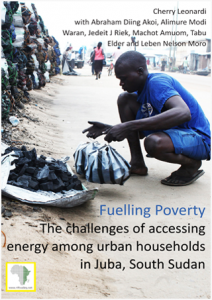In South Sudan, access to energy is crucial for survival, recovery and resilience in what is an extremely challenging economic and security environment. Fuelling Poverty—a product of the Energy on the Move project—examines the challenges of meeting everyday energy needs for the urban population of Juba. Recent urbanisation, conflict and economic crisis have fundamentally reshaped the amount and forms of energy that people can access. Primarily this has involved a major expansion of the charcoal trade and reliance on urban markets for purchasing household fuel, with implications for environmental degradation and conflict potential in the surrounding rural areas. In particular, the report focuses on the lives of Juba’s women, who are at the forefront of the daily effort to find fuel. It concludes that more efforts—both national and international—should be made to improve access to clean and affordable energy sources, which are fundamental to the health and wellbeing of both people and environment.
This research was implemented by the Rift Valley Institute and funded by a UK Economic and Social Research Council Grant (Ref: ES/R00269X/1) awarded to Durham University (PI: Ben Campbell). The report is written by Cherry Leonardi based on research by Abraham Diing Akoi, Alimure Mödi Waran, Jedeit J Riek, Macot Amuom and Tabu Elder, overseen in the first phase by Leben Nelson Moro. Thanks to Nhial Tiitmamer for a very helpful review of the report and to all the partners on the Energy on the Move project led by Ben Campbell.




